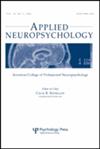Psychometric validation of the Italian Self-Report Symptoms inventory (SRSI): Factor structure, construct validity, and diagnostic accuracy.
IF 1.7
4区 心理学
引用次数: 0
Abstract
The Self-Report Symptom Inventory (SRSI) is a novel tool designed to detect symptom overreporting and other forms of noncredible responding. Unlike existing scales, the SRSI includes genuine and pseudosymptoms scales covering cognitive, affective, motor, pain, and post-traumatic stress disorder domains. The present study aims to investigate the psychometric properties of the Italian Version of the SRSI (SRSI-It), in particular, its factor structure, reliability, convergent and discriminant validity, and diagnostic accuracy. Data from 1180 healthy participants showed a hierarchical structure with higher-order constructs for genuine symptoms and pseudosymptoms, each comprising five subscales. The SRSI-It showed a strong convergent validity with the Structured Inventory of Malingered Symptomatology and discriminant validity through low correlations with the Psychopathic Personality Inventory-Revised. Receiver operating characteristic analysis determined cut scores of 6 (95% specificity) and 9 (98% specificity) for pseudosymptoms, with a Ratio Index score of 0.289 (82% specificity). In summary, the SRSI-It appears to be a promising tool for identifying symptom exaggeration in clinical and forensic contexts, ultimately enhancing the quality and reliability of evaluations in these contexts.意大利症状自述量表(SRSI)的心理计量验证:因子结构、构建有效性和诊断准确性。
症状自评量表(SRSI)是一种新型工具,旨在检测症状过度报告和其他形式的非可信反应。与现有量表不同的是,SRSI 包括真实症状和假症状量表,涵盖认知、情感、运动、疼痛和创伤后应激障碍等领域。本研究旨在调查意大利语版 SRSI(SRSI-It)的心理测量特性,尤其是其因子结构、可靠性、收敛性和区分性有效性以及诊断准确性。来自 1180 名健康参与者的数据显示,真实症状和假性症状具有高阶结构的分层结构,每个分层结构包括五个子量表。SRSI-It 与 "不良症状结构化量表 "具有很强的收敛性,与 "变态人格量表-修订版 "的相关性较低,因此具有很强的区分性。接收者操作特征分析确定假症状的切分分数为 6(特异性为 95%)和 9(特异性为 98%),比率指数为 0.289(特异性为 82%)。总之,SRSI-It 似乎是一种很有前途的工具,可用于识别临床和法医环境中的症状夸大,最终提高这些环境中评估的质量和可靠性。
本文章由计算机程序翻译,如有差异,请以英文原文为准。
求助全文
约1分钟内获得全文
求助全文

 求助内容:
求助内容: 应助结果提醒方式:
应助结果提醒方式:


